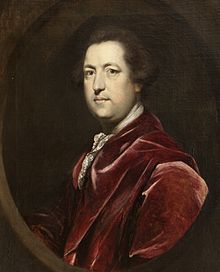This article includes a list of general references, but it lacks sufficient corresponding inline citations. (June 2014) |
Charles Townshend | |
|---|---|
 Portrait by Joshua Reynolds | |
| Chancellor of the Exchequer | |
| In office 2 August 1766 – 4 September 1767 | |
| Monarch | George III |
| Prime Minister | The Earl of Chatham |
| Preceded by | William Dowdeswell |
| Succeeded by | Lord North |
| President of the Board of Trade | |
| In office 1 March 1763 – 20 April 1763 | |
| Preceded by | The Lord Sandys |
| Succeeded by | The Earl of Shelburne |
| Personal details | |
| Born | 27 August 1725 Raynham Hall, Norfolk, England |
| Died | 4 September 1767 (aged 42) |
| Political party | Whig |
| Spouse | Lady Caroline Campbell |
| Alma mater | University of Leiden University of Oxford |
Charles Townshend (27 August 1725 – 4 September 1767) was a British politician who held various titles in the Parliament of Great Britain. His establishment of the controversial Townshend Acts is considered one of the key causes of the American Revolution.
Townshend was born at Raynham Hall in Norfolk, England, as the second son of Charles Townshend, 3rd Viscount Townshend, and Audrey Harrison. A sickly child, he later graduated from Leiden University and served in various political roles, including as a member of the Board of Trade, Lord of the Admiralty, Paymaster of the Forces, and Chancellor of the Exchequer. He played a significant role in the taxation and control of American colonies, proposing the Townshend Acts, which imposed taxes on various exports to America. These acts were met with resistance and eventually led to the American Revolution. Townshend died in September 1767. He was married to Caroline Campbell, who later became the Baroness Greenwich, and his brother, George Townshend, became the Lord-lieutenant of Ireland.